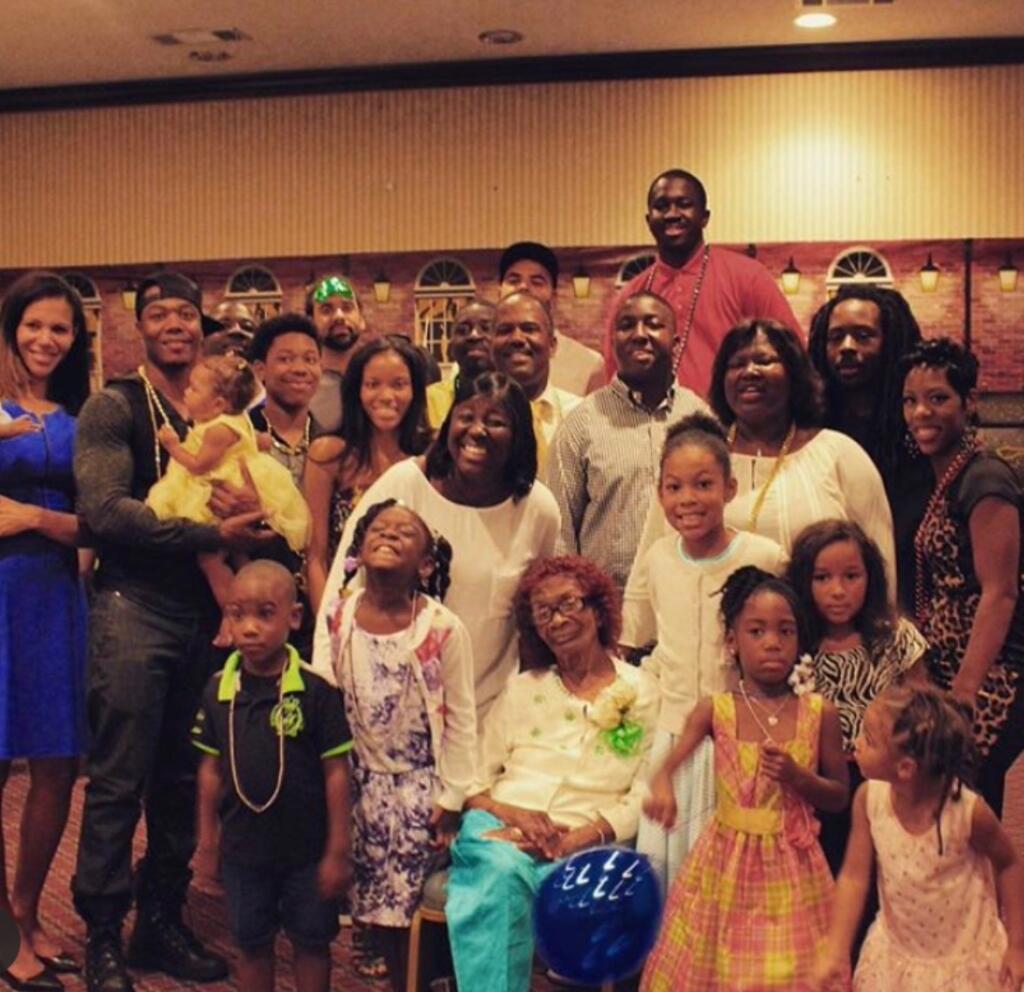
Tribute to My Grandmother, Mudear, Leeanna Barney Collins – 1935-2021
More Videos
Published: December 22, 2021
By: Willie Barney, Co-Publisher Revive Omaha
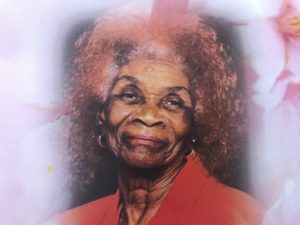
Just last month, we celebrated the life and homegoing of my grandmother, Mudear, Leeanna Barney Collins. The writing on the casket, “Heaven has gained a new Angel.” I told my cousin Tina, “I hope they are ready.”
She had her own way. Her own style. There will never be another one like her. She was the original. Loving. Tough. Strong. Full of joy, laughter and humor. Full of faith.
God bless the spirit and soul of my amazing, one of a kind grandmother. Mudear will live on forever. Her legacy continues because we are her legacy. We will honor her life and the way she loved and taught all of us. High expectations. Tough love. Discipline. Family. Joy. Laughter. Community. Most importantly, seek God first. She is one of the main reasons I do what I do.
I was honored to be able to read scripture and pray during the service for Mudear.
“Seek ye first the Kingdom of God and all his righteousness and all these things will be added unto you.” That was the scripture God put in my spirit to read at the homegoing. She pointed us to God from an early age.
Attached is a tribute I wrote earlier this year when I learned that she had become very ill. She celebrated 86 years of life on Oct 27th.
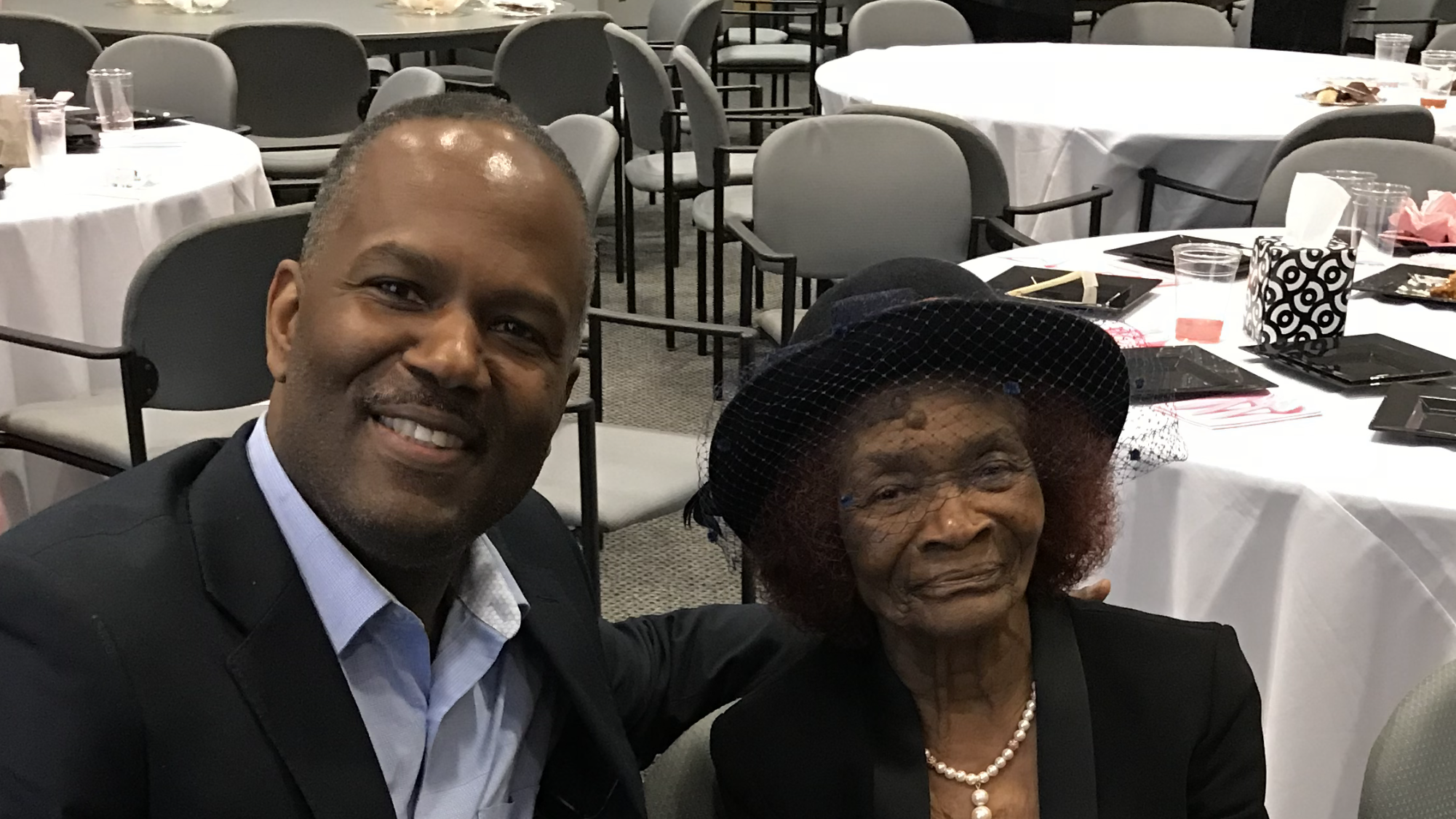
(Our last photo together)
I woke up this morning thinking about my grandmother who we have affectionately, lovingly and with great respect called Mudear as long as I can remember.
Her name is Leeanna Barney Collins, but everyone who knows her calls her Mudear. She’s the strongest, boldest, kindest, wisest, most caring and yes most humorous grandmother you will ever meet.
She’s also tough and don’t take no mess and will protect her family at all costs. As we grew up, I don’t know how she took care of all of us. At one point, many of us all lived in a small house in rural Mississippi fueled by gas space heaters and supported by an outhouse complete with all kinds of snakes in the backyard.
She, my mom and aunt Delores always made sure we had enough to eat although my uncles would leave you crumbs if you were late to the table.
She made sure we traveled to Greenville to shop for back to school clothes. Man, there was nothing like going shopping with Mudear. She was always dressed for the occasion and walked in those stores holding her purse, back straight and head high like she owned the place.
That annual trip to get school clothes was one of the highlights of my year. Heading to Greenville to shop at “Looking Good” and other stores was a true adventure to a small child.
She comes from a long line of distinguished family members. My great grandfather was a land owner. My great grandmother took care of a large family but passed at a young age. Most of the family came from Louisiana, Tensas Parish to be exact. As I was told, the family moved to Mississippi in the middle of the night because another landowner and a sharecropping relationship where our family worked would always end up owing at the end of the year.
From her early years, Mudear took care of her brothers and sisters. She has taken care of not only family, but friends, neighbors and anyone that passed by and needed a plate didn’t leave empty handed.
She took us to church. She sang gospel songs in the kitchen with my Aunt Delores and mom in the morning before we left. She made sure we made it to Harvest Festival and my Aunt Delores who we still call Mama to this day, made sure we had Easter speeches and learned our ABCs and multiplication (times) tables.
Mudear didn’t play when it came to discipline, going to school and getting good grades. She would have us put our report cards on the table when we came home from school. The next morning we would learn about the repercussions if our grades were not satisfactory. Let’s just say the neighbors knew if you weren’t making A’s and B’s. C’s weren’t allowed in the house.
Mudear has always been an incredibly giving woman. She and our neighbors in the Village on 438 would always support each other. When one didn’t have something, the other would provide.
We had a neighbor down the highway that grew corn, beans and peas. We would shell the peas for my grandmother. She would also preserve food for our family and for neighbors.
Another neighbor always raised chicken. We weren’t short on eggs very often. Periodically we were sent next door to get sugar, salt or something else. Other times, we were sent with a plate to make sure they had enough to eat. Mudear made sure everyone was taken care of.
We didn’t have a car so we walked just about everywhere except when we needed to go into the nearest small town which was Arcola or the “big trips” to Greenville. Usually when we went to Arcola on the back of my uncle Albert’s truck, it was to wash clothes for the week at the Arcola laundry or buy groceries at Tams Foodway. My grandmother made sure we had some change to get a few cookies at the store, but don’t ask for nothing else and we knew enough not to act a fool in the store. As a child, it seemed like everyone in Arcola knew Mudear.
Some of the great moments that I can remember as a child were sitting and listening to my grandmother tell stories about her life growing up in Louisiana. She is one of the greatest story tellers on the planet. A gift she passed on to others in the family. Even to this day, when we get together for reunions and celebrations, we will sit and laugh all night long as each family member takes turns recounting stories about Mudear and things we did as children on Highway 438.
My personal favorite was when she told about the time that she was chased in a red dress by a bull. She would also tell us about how there were times in Louisiana where the flooding was so bad they had to wait on top of the roof for boats to come get them. I couldn’t really picture this until years later I watched Hurricane Katrina hit New Orleans and people sat on rooftops waiting for the national guard and others to save them. I thought to myself, wow that is exactly what my grandmother was saying.
My Mudear had been very ill lately. Family members have been doing everything they could to assist her and show her the kind of love she had shown all of us all of these years.
God bless the soul of my amazing, one of a kind grandmother. Mudear will live on forever. Her legacy continues because we are her legacy. We will honor her life and the way she loved and taught all of us. High expectations. Tough love. Discipline. Family. Joy. Laughter. Community. Most importantly, seek God first.
Of all the families in the world. I am so glad. I am incredibly thankful. This is my family. This is my village. I thank God for the way we grew up. I thank God for the good times. The tough times. The joy and the laughter. One of a kind. One of a kind.
You may like
NEWS
Beyond the Flames of Protest Part II: Solutions and Moving Forward with a Plan
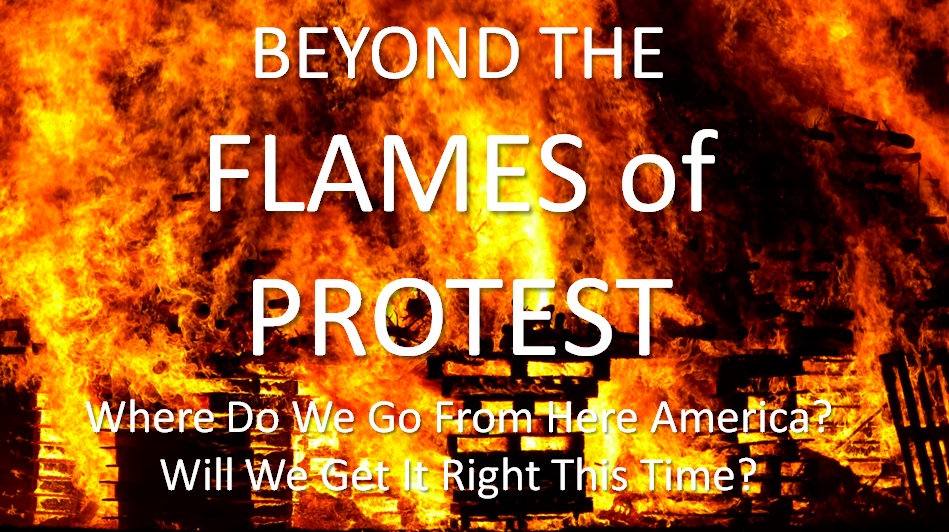
Published: June 15, 2020
By: Willie Barney, Co-Publisher Revive Omaha
Beyond the Flames: Why I Believe 2020 is a Turning Point
Where Do We Go From Here? Transformation 2025
Part II: Moving to Solutions
Omaha might not be in flames now, but we have a playbook. George Fraser has called Omaha the Montgomery of the economic rights movement. Pastor Freddie Haynes calls it the Selma of the next great movement. They and others believe there are answers in Omaha.
On a personal level, after years of reading, researching and studying solutions, we embarked nearly fifteen years ago on a journey to move the dial and change the trajectory of our community. Hundreds of organizations and thousands of residents, both youth and adults, have participated. Both black and white. Both civilian and police. North, South, East and West.
I’m hopeful because through collaboration, we have made measurable progress in 8 of 10 key areas.
Through the collective efforts of hundreds of organizations and thousands of residents:
- Gun violence was decreased by 74%
- African-American high school graduation rates increased from 64% to 81%.
- The percentage of African-Americans with a bachelor’s degree increased from 16% to 22%.
- African-American unemployment was reduced from nearly 21% to 7.5%.
- Employment for youth increased from 30 summer jobs to over 1,000.
- The African-American poverty rate was reduced from 33% to 24%.
- A new grocery store was built, some neighborhood stores were converted and fresh fruit and vegetables were brought to the community.
- The Affordable HealthCare Act reduced the percentage of uninsured and did not penalize for pre-existing conditions.
- Major revitalization efforts were launched, securing hundreds of millions of dollars in public/private investments.
- A new wave of innovative black entrepreneurs is emerging.
One of the most significant areas of progress is the work we’ve done collectively to build stronger partnerships between police and community and begin addressing justice issues. Body cameras, diversity training, open communication, police diversity and reductions of use of force have resulted from collaboration. In Omaha, a city of 460,000, there has been one officer involved shooting in the past eighteen months. Cities across the nation are looking to replicate the Omaha 360, a nationally recognized model.
To be sure, we never thought the work was done. We know significant gaps still exist. Yet, we also know that it is possible to move the dial.
In 2014, partly fueled by the flames of Ferguson, we made a proposal to accelerate the progress of African-Americans and North Omaha and identified the level of investment it would require. The plan became known as Transformation 2025 Initiative. It was based on the input of over 8,000 people, implementation of successful projects and aligned with the findings of the Kerner Report and Freedom Agenda.
We secured some initial investments. We aligned efforts. We built effective collaborations. We pushed for large scale investments with specific goals, strategies, initiatives, programs and policies identified.
The areas where we secured funds we have been able to produce tangible, measurable results. But when it came to the larger proposals, we were told there are no additional funds.
“Where would we ever find that level of funding?”
Omaha can find the funds when it becomes a priority. Hundreds of millions of dollars for downtown redevelopment. $140 million for the TD Ameritrade baseball stadium. Hundreds of millions for a new Buffett Cancer Center. $200 million just approved by citizens to improve streets and the list goes on. To be clear, these are all great investments for the City of Omaha. I stand in full support. They are all needed and benefit the city and region. However, these investments prove the point: Omaha and other cities can move the dial and we can find the resources to do what we prioritize.
As described by Obama Foundation officials who visited our community, “Omaha is a get it done city.”
We are now faced with the same decision that the nation and city confronted in 1968.
Invest in people or invest in prisons? Invest in residents or invest in buildings. Invest in prevention or invest in penalties. Invest in proactive solutions or civil unrest.
In 2020, what decision will we make? This is our turning point.
We know how to put out the fire. I believe that collectively, with the fires raging and in the midst of a pandemic, we will make the right decision. In the words of Dr. King, “We will finally make justice a reality for all of God’s children.”
As African-Americans, we must unite and do our part. Support black businesses and businesses in North Omaha. Vote. Create generational wealth. Continue reinforcing the importance of education. Take care of our health. Work together to address justice and reform. Engage with the community to address race relations and inequities. Use all of our gifts and assets. Partner with allies.
Omaha. America. You must do your part. Listen. Allow African-Americans and residents from neighborhoods most impacted to lead. Partner and support. Be an ally. Implement new policies to reform the justice system. It is time to invest at the scale of the problem.
Invest in entrepreneurship and access to credit and capital. Invest in employment, diversity and higher wages. Invest in safe, affordable housing and mixed income neighborhoods. Invest in education and high performing school models. Invest in prevention, intervention, community policing and reentry programs. Invest to make healthcare accessible and affordable for all.
We can all win. Let’s design a society and democracy that works for all of its citizens. The rest of the world is watching. Will this grand experiment finally and fully become what it can be? A place where all citizens are spiritually, economically and socially thriving, healthy and prosperous.
In Omaha, the early indications from all sectors is that it will be different this time. We have the will and the appetite to make this the turning point. We can put the flames out for good this time.
______________________________________________
Two additional thoughts. There are other plans that have been developed and numerous individuals and groups who are working diligently on their initiatives, projects, programs and policies. Our goal is to create a combined plan that we can all work on together and do our part in a collaborative way.
In addition, many individuals, organizations, foundations, businesses and ministries have invested tremendous amounts of time, talent and treasure into various initiatives generating measurable outcomes. We should pause and recognize these committed partners. Now, together, we will focus more intensely on wealth, health and ownership.
NEWS
Beyond the Flames of Protest Part I: Why I believe 2020 is the Turning Point for Black America

Published: June 15, 2020
By: Willie Barney, Co-Publisher Revive Omaha
Beyond the Flames: Why I Believe 2020 is a Turning Point
Where Do We Go From Here?
Harlem. Watts. Newark. Detroit. Omaha. Los Angeles. Ferguson. Baltimore. Minneapolis.
“If we don’t learn from history, we are destined to repeat it.”
– Philosopher George Santanya and Winston Churchill
In 2014, as I watched the fires burning in Ferguson, Missouri, I wrote a piece entitled “Beyond the Flames: Will We Get It Right This Time?” Ferguson was burning in response to the devastating scenes following the killing of Michael Brown by a police officer. I was so impacted and moved that I had to write down on paper what became a speech I gave at the University of Nebraska-Lincoln.
This followed the 2012 vigilante killing of Trayvon Martin and preceded the 2015 death of Freddie Gray in police custody which ignited the flames in Baltimore. The frustrating and devastating list goes on and on and continues today.
There have been other shootings of unarmed black men and black women when police officers received no repercussions from their crime. This list also includes Omaha after the officer-involved shooting of Vivian Strong in 1969 that resulted in the destruction of North 24th Street. The once thriving corridor is just now in the process of being rebuilt.
No justice for Eric Garner, New York, 2014. No justice for Sandra Bland, 2015, southeast Texas. No justice for Philando Castile 2016, suburban Minnesota. No justice.
African-Americans have tried to send a message for decades that we are suffering. Suffering from the lingering impacts of slavery, Jim Crow and segregation effects that were never fully addressed. Suffering from unemployment, lack of investment, neglect, poor educational outcomes, low access to capital, over policing, poor housing conditions and so much more. There have been small attempts to fix the situation, but nothing substantial and sustained.
A temporary reconstruction period followed the abolishment of slavery where some progress was made, but abandoned just at the time when freed slaves were finally starting to become integrated into American life. No Justice.
There were promises made beyond the elimination of slavery. Promises for land, property and finances for the freed slaves to get a new start at becoming full citizens. Policies were changed to finally recognize African-Americans as being 100% human, correcting the Constitution which had declared us as 3/5ths of a man.
The original constitutional declaration allowed America to benefit economically for over 250 years from free labor through inhumane conditions. It is referred to as the worst form of enslavement in modern history. African-Americans helped build this country and were paid nothing for it. No Justice.
What’s happening today is not new. Racial tensions have raged before. There has always been a spark which kindled the flames.
These flames have come as city after city and community after community across the nation have been destroyed.
Before Richard Nixon was elected in 1968 on the promise to be a law and order president, President Lyndon B. Johnson (LBJ) commissioned a group to find out why the cities across the country were burning. The commission produced a document which became known as the Kerner Report.
Rather than identifying African-Americans as the cause, the report shined the light on white America. The Kerner Commission presented the case that the blame for the riots should be placed squarely on the shoulders of underlying conditions of injustice, neglect, disinvestment, unequal treatment and systematic racism.
The report clearly states the priorities that must be addressed: 1. Unemployment and low wages. 2. Poor educational systems. 3. Poor housing conditions. 4. Bad relationships between police and the community. 5. Lack of services for those in poverty and the structure of welfare system.
The most important conclusion to address the injustice? America needed to make a significant investment to right the wrongs of the past.
Little did I know until recently that the former Mayor of Omaha, A. V. Sorensen, had reached the same conclusion in 1968. He said then that Omaha needed to bring together people from all sectors to form a coalition that would oversee a massive investment to address African-American poverty. Nothing was done.
He left office realizing the city did not have the will or appetite to fully address the issue. The city and nation continued redlining and driving interstates through the heart of black communities under the guise of urban redevelopment.
America chose to make small investments to address the injustice, but with a costly Vietnam War occurring at the same time, Dr. Martin Luther King, Jr. declared that the nation had given black America a blank check. He said the easy part of the Civil Rights Movement was getting legislation passed for voting rights; the hard part was securing the funds to address the economic issues. This was going to cost the nation money, King said.
For a time, mostly through programs enacted by President Johnson, some investments were made through the so-called War on Poverty. The investments were not sustained and were not implemented anywhere near the level required.
One of the most significant statements and conclusions from the Kerner Commission was “to mount programs on the scale equal to the dimension of the problems.” “These programs will require unprecedented levels of funding and performance…”
The report emphasized that if America didn’t respond on a large scale, we would see the creation of two America’s. One black. One white. Separate. Unequal.
Across the nation, we have inherited the promise. Two Americas. One white. The other, everyone else (black and brown).
I wrote in the speech, after watching the flames in Ferguson, that in 1968, the nation had a decision to make. Do we finally invest in helping African Americans become economically sound and full citizens or do we invest more in police, expanding the criminal justice system and building more prisons?
President Richard Nixon answered the question for America. Law and order. No Justice.
For decades, African-Americans have asked for additional investments to address employment, education, housing, health and other needs. Funding was never available at the scale of the problem. Communities were not rebuilt.
African-Americans asked for the promised 40 acres and a mule. African-Americans presented plans such as the Freedom Agenda under Dr. King which proposed to end poverty in 10 years. African-Americans asked for reparations.
It is important to note reparations have been granted across the world after a specific race, ethnic group or nation was on the wrong end of injustice. The answer to these requests for African-Americans? No funds available. No justice.
Where would America ever come up with trillions of dollars to right this wrong? We were always told, it would be absolutely impossible. We were told there is absolutely no way America could ever come up with trillions of dollars to address its original sin. It’s been over 400 years since enslaved Africans were brought to these shores.
But, no recompense. No Justice.
Instead we are told, pick yourself up by your bootstraps and help yourself. Instead we are told, forget about slavery. Instead we are told, you’ve had a black President. Instead we are told, it’s a post-racial society and racism doesn’t exist. Help yourselves, we are told. There will be no hand up, we are told.
Cue the Coronavirus.
The virus may not be racist, but the impact surely is disproportionately destructive to African Americans and other people of color. Health and economic inequities have been laid bare. Consequently, the virus called for a critical response. A national response.
What does COVID-19 have to do with this justice and systemic racism? As soon as the nation began to experience the negative economic and health impacts of the virus, immediate legislation was drafted and approved by Congress. The Treasury Department rewrote the rules. Trillions of dollars were miraculously found and infused into the economy to address suffering corporations, small businesses and most U.S. citizens.
In a moment of crisis, leaders can find the money.
The message this sends is that it matters who is suffering. African-Americans have been suffering for centuries. Native Americans have been suffering for centuries. However, when the unemployment rate for white Americans hit the same level as the African-American unemployment rate which has languished for decades, Congress and the Treasury department have taken actions to produce what is estimated at seven trillion dollars of economic activity.
The question is where did the money come from in this instance? It’s been made abundantly clear that the nation could have made the right decision in 1865. We could have made the right decision in 1918. We could have made the right decision in 1968. We could have made the right decision in 1992 after Los Angeles and Rodney King. We could have made the right decision after Ferguson in 2014. We could have made the right decision after Baltimore in 2015.
No justice. No peace. Fast forward.
Cue the final spark.
Watching an unarmed black man, George Floyd, die a horrific death with the knee of a white police officer on his neck, and 2 other officers on his prone body behind the car, the image was finally too much. African-Americans have experienced police brutality and violence for decades, but this was filmed, became a viral moment on social media, and impossible to ignore, deny or cover up. Breaking point.
In the midst of a pandemic which has killed over 100,000 Americans and disproportionately impacted African Americans and people of color, we once again are face to face with injustice and racism.
After being locked away in their homes for nearly three months and watching the video from Minneapolis and dozens of other racial events within a few weeks, cities across the country and internationally have erupted with protests and flames are once again burning in America.
What to do now? Where’s the hope?
We know what needs to be done. We have known for decades. Case study after case study, commission after commission and book after book, have boiled down to economics, education, housing, equal access to health care and people working together to address poverty and systemic racism.
Be sure to check out Part II: Moving Forward with Solutions
NEWS
America has had its knee on the neck of black men: A new day is coming
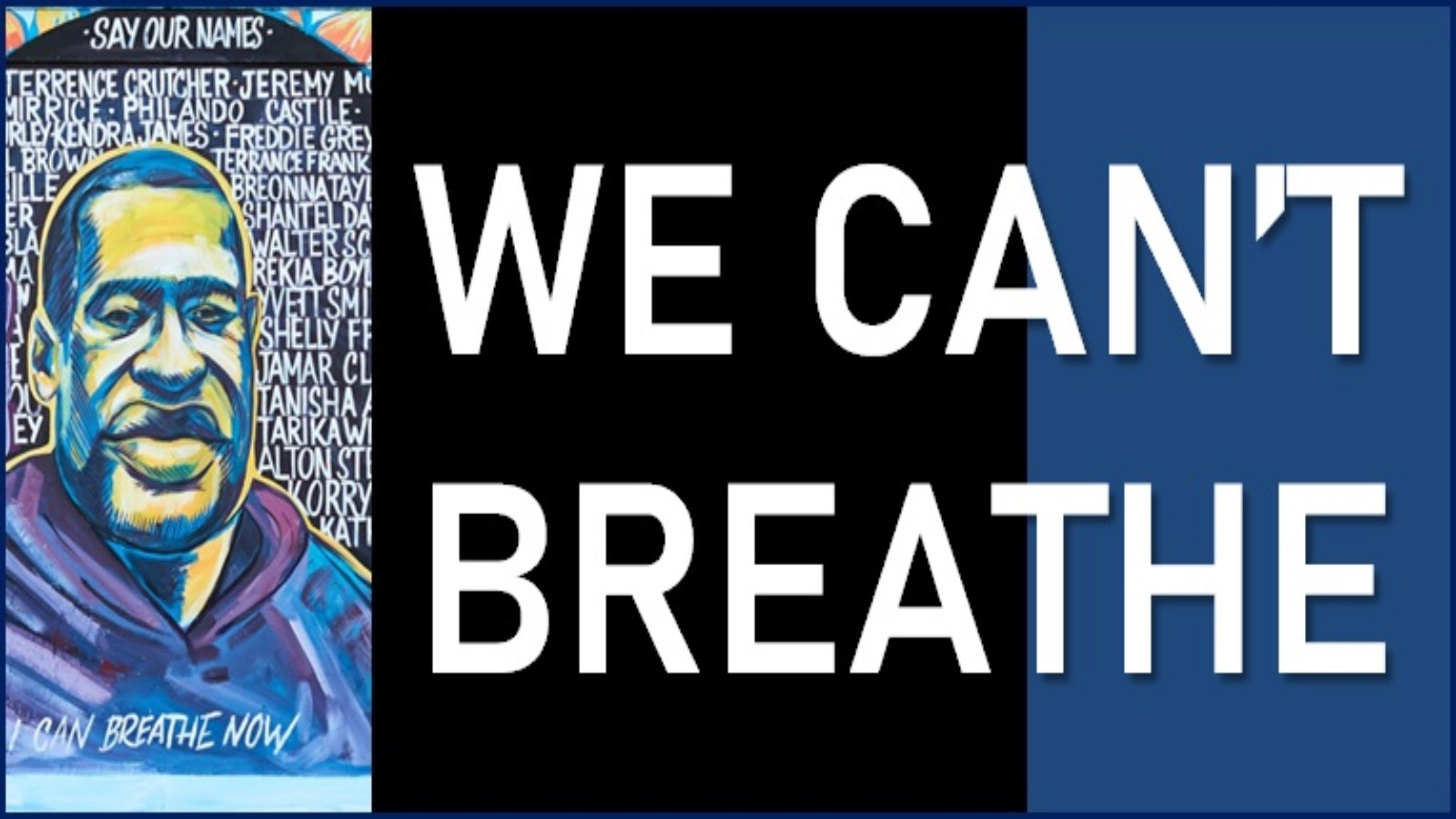
By: Willie Barney
Co-Publisher
Revive! Omaha Magazine
May 27, 2020
In response to the murder of George Floyd and the continuous senseless violence against black men.
Stay Strong. A New Day is Coming.
Reality. America has had its knee on the neck of black men since its beginning. Slavery. 3/5th of a man. Jim Crow. Redlining. Prison industrial complex. Destruction of lives, families and property. Now, it’s being televised and broadcast daily on social media. Can you imagine what was happening before the cameras began to capture this reality? Even with cameras on, it is still happening.
And for those that always raise the “what about black on black crime” flag every time incidents like this happen, we are just as concerned anytime a person loses their life to any kind of violence. But make no mistake, when you see people who are sworn to protect and serve, use their power to murder a man on the street, it also calls for an immediate response and call for justice. And after investing nearly 15 years in a fight to end gun violence, I’ve come to realize that even the everyday street violence is a byproduct of neglect, racism, disinvestment and systemic oppression.
I am tired of the devastating deaths, threats and falsified accusations. I’m praying for the family of George Floyd and all of those impacted by this straight out racism, senseless violence, hatred and murder. The officers should be arrested and charged.
Even in the midst of COVID 19 and these repetitive tragedies, I fully believe that 2020 is a turning point. From the excruciating pain and suffering, will come revival, restoration and revitalization. We will not stay down for much longer.
Stay strong brothers, sisters and allies. I’ve read a lot of posts of frustration, anger, exasperation and some that appear to be overwhelmed and want to give up. We’ve come too far to give up now.
The middle passage didn’t destroy us. Slavery didn’t destroy us. Jim Crow didn’t destroy us. Segregation didn’t destroy us. Senseless violence will not destroy us. Always remember, we are gifted, resilient, overcomers, kings and queens. Our time is coming.
These deaths will not be in vain. Together, we will solve this. Our history and my life experiences tell me it’s possible to create change. We’ve been able to move the dial here. While not perfect and there’s always more work to do, we have collectively built stronger relationships and we will keep doing so. A new day is coming. Stay strong.

